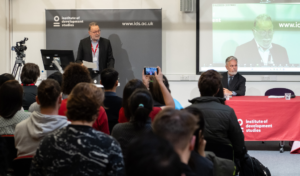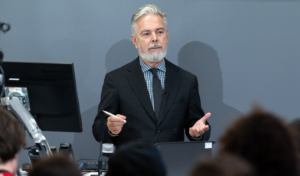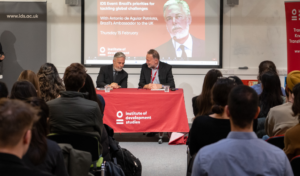The return of Luiz Inácio Lula da Silva to the presidency and his announcement that ‘Brazil is back’ has been met with much expectation worldwide. Added to this, Brazil is a key focus for global policy engagement this year due to holding the presidency of the G20 and hosting the UN climate summit COP30 in 2025. The country’s stewardship of critical biomes, including the Amazon and the Cerrado, also place it at the forefront of climate and environmental debates.
Last week IDS hosted His Excellency Antonio de Aguiar Patriota, Brazil’s Ambassador to the UK, to discuss Brazil’s vision for tackling pressing global challenges around the key themes of democracy, sustainability and peace.
Find out more about the IDS Brazil Initiative
The event, part of the IDS Brazil Initiative and the Brazil in the World event series, comes at an opportune time for IDS as it prepares for T20 Brazil, the G20 aligned initiative for think tanks and research centres from G20 members.
Ambassador Patriota outlined three priorities for Brazil’s Presidency of the G20: democracy, sustainability, and peace.

Democracy
The third Lula administration follows the controversial administration of President Jair Bolsonaro (2019-22), who oversaw the reversal of multiple progressive policies, adopted controversial and regressive stances on climate change and the reversal of many of the hard won indigenous rights.
Ambassador Patriota said:
“’Brazil is back’ is a sentence that is charged with meaning…for a country that was ruled by a monarchy for most of the 19th century, and then ruled by very powerful economic groups, to then elect a trade union leader from the proletariat with only a secondary education…who places a lot of emphasis on social development, reducing poverty, hunger and inequality,” said Ambassador Patriota.
He continued:
“Inequality is the enemy of sustainable development; it is also often the enemy of democracy. Inequality creates social tensions and…opens the gateway to undemocratic platforms that I think should be of concern.”

Sustainability
Lula has pledged to reverse the damage caused by the Bolsonaro administration, work towards zero deforestation of the Amazon by 2030 and reverse the degradation of all Brazilian biomes.
While speaking about sustainability and the environment, Ambassador Patriota said:
“No matter how virtuously Brazil behaves in terms of protecting the forest and combating illegal deforestation, the Amazon will still be under threat due to global greenhouse gas emissions by the rest of the international community. There could be a tipping point that has nothing to do with Brazilian policies but are actually the consequence of irresponsible behaviour elsewhere. This dilemma can be summarised as there is no salvation without cooperation.”

Peace
“It is impossible to talk about sustainability at all unless you have a minimally stable political situation. How can you address the issue of sustainability in Gaza today for example where the entire environment is being destroyed?” said Ambassador Patriota, highlighting a new report showing that defence spending globally increased by nine per cent last year, whilst peacebuilding initiatives often struggle for funding.
“There is a widespread recognition that the multilateral system is not adequately working,” he continued “There are those that say we could start from scratch and begin again; I think this is very dangerous. There are some important achievements that have been attained by the multilateral system that need to be preserved…Just because people do not respect the rules of traffic lights, it does not mean that you are going to do away with traffic lights altogether.”
He continued:
“Brazil is a strong believer in diplomacy. We are very troubled where an entirely disproportionate amount of resources are being channelled to military activity…something president Lula says often, that all these wars end up profiting somebody. And it is not the people where the fighting is taking place, it is the deep pockets of the weapons producers, mostly in highly developed countries.”
Brazil/UK relations and the T20
The Government of Brazil has signalled that its G20 Presidency will emphasise openness to policy and implementation proposals generated by the Think-Tank Engagement Group (T20), led by IPEA, FUNAG and CEBRI while engaging a large number of national and foreign think tanks, encouraging the participation of a large number of academics and other international actors from amongst the G20 members and beyond.
IDS has been invited to play a key role in ensuring the participation of UK think-tanks in the T20 process. IDS is a member of the International Advisory Council and is participating actively with leadership roles within task forces, as well as through policy brief and side event proposals with many of our longstanding partner think-tanks from the Global South.
As Ambassador Patriota said:
“The T20, which IDS is the focal point in Great Britain…is an extraordinary opportunity to tap into the creativity, the imagination and the know-how of institutions of excellence like IDS to produce and feed them into intergovernmental debates.”
Ambassador Patriota highlighted the alignment between IDS and Brazil, pointing out that, IDS “speaks the same language as the government I represent where the emphasis is on devising the most effective policies for reducing inequality, poverty, promoting development that is sustainable and environmentally responsible, and also democratic while being based on respect of the rule of law.”